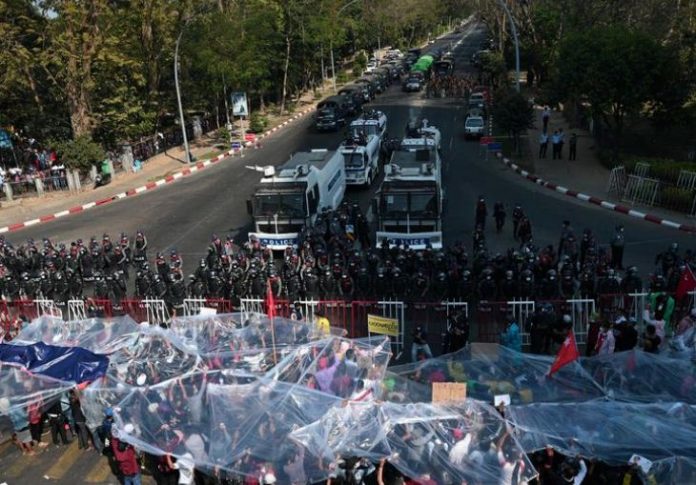Protesters returned to the streets of Myanmar on Wednesday after the most violent day yet in demonstrations against a coup that halted a tentative transition to democracy under elected leader Aung San Suu Kyi.
The United States and United Nations condemned the use of force against protesters, who demand the reversal of the coup and the release of Suu Kyi and other detained leaders of her National League for Democracy (NLD) and activists.
“We cannot stay quiet,” youth leader Esther Ze Naw told Reuters. “If there is blood shed during our peaceful protests, then there will be more if we let them take over the country.”
Thousands of people joined demonstrations in the main city of Yangon. In the capital Naypyitaw, hundreds of government workers marched in support of a growing civil disobedience campaign, which was started by health workers.
A doctor said one protester was expected to die from a gunshot wound to the head in Tuesday’s protests. She was wounded when police fired guns, mostly in the air, to clear protesters in Naypyitaw. Three other people were being treated for wounds from suspected rubber bullets, doctors said.
Protesters were also hurt in Mandalay and other cities, where security forces used water cannon and arrested dozens. State media reported injuries to police during their attempts to disperse protesters, who were accused of throwing stones and bricks.
The military has imposed restrictions on gatherings and a night curfew in the country’s biggest cities.
The U.S. State Department said it was reviewing assistance to Myanmar to ensure those responsible for the coup face “significant consequences”.
“We repeat our calls for the military to relinquish power, restore democratically elected government, release those detained and lift all telecommunication restrictions and to refrain from violence,” spokesman Ned Price said in Washington.
The United Nations called on Myanmar’s security forces to respect people’s right to protest peacefully.
“The use of disproportionate force against demonstrators is unacceptable,” Ola Almgren, the U.N. representative in Myanmar, said.
The protests are the largest in Myanmar in more than a decade, reviving memories of almost half a century of direct army rule and spasms of bloody uprisings until the military began relinquishing some power in 2011.
Avinash Paliwal, a senior lecturer in international relations at the School of Oriental and African Studies at the University of London, said Myanmar will not be as isolated now as it was in the past, with China, India, ASEAN and Japan unlikely to cut ties.
“The country is too important geo-strategically for that to happen. The U.S. and other Western countries will put sanctions – but this coup and its ramifications will be an Asian story, not a Western one,” Paliwal said.
CRITICAL CONDITION
A doctor in Naypyitaw said the woman who was shot in the head with a live bullet remained in a critical condition but was not expected to survive. Social media video verified by Reuters showed her with other protesters some distance from a row of riot police as a water cannon sprayed and several shots could be heard.
The woman, wearing a motorcycle helmet, suddenly collapsed. Pictures of her helmet showed what appeared to be a bullet hole.
Myanmar’s army took power citing allegations of fraud in a Nov. 8 election that Suu Kyi’s NLD party won by a landslide. The electoral commission dismissed the army’s complaints.
Late on Tuesday, police raided the NLD’s headquarters in Yangon during the hours of a military-imposed curfew, elected lawmakers said.
Suu Kyi’s party had been due to start a second term on the day of the coup.
Alongside the protests, a civil disobedience movement has affected hospitals, schools and government offices. Staff from the electricity and power ministry in Naypyitaw were among the latest to join the civil disobedience movement on Wednesday.
Activist Min Ko Naing called in a Facebook post on all government workers to join the disobedience campaign, and for people to take note of who did not participate.
“We need to praise them and we need to protect them. We also need to prepare to take action sometime later to those who threatened and oppressed.”
Protesters’ demands now go beyond reversing the coup.
They also seek the abolition of a 2008 constitution drawn up under military supervision that gave the generals a veto in parliament and control of several ministries, and for a federal system in ethnically diverse Myanmar.
Suu Kyi won the Nobel Peace Prize in 1991 for campaigning for democracy and spent nearly 15 years under house arrest.
The 75-year-old faces charges of illegally importing six walkie-talkies and is being held in detention until Feb. 15. Her lawyer said he has not been allowed to see her.
Suu Kyi remains hugely popular at home despitedamage to her international reputation over the plight of theMuslim Rohingya minority.
Source : Reuters
















